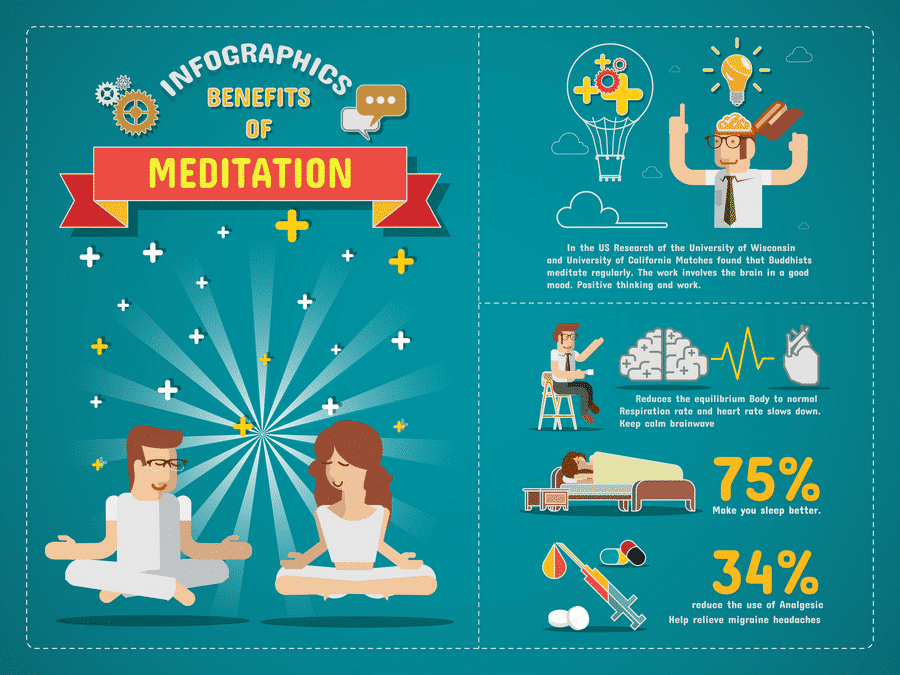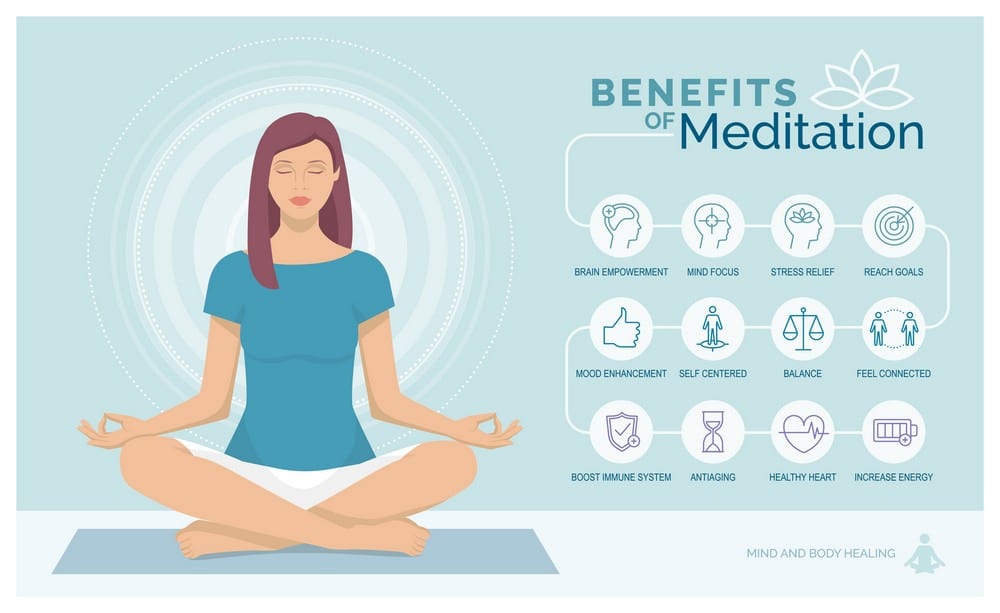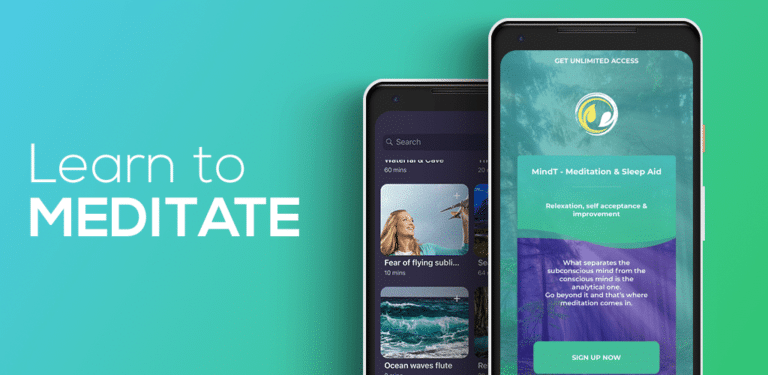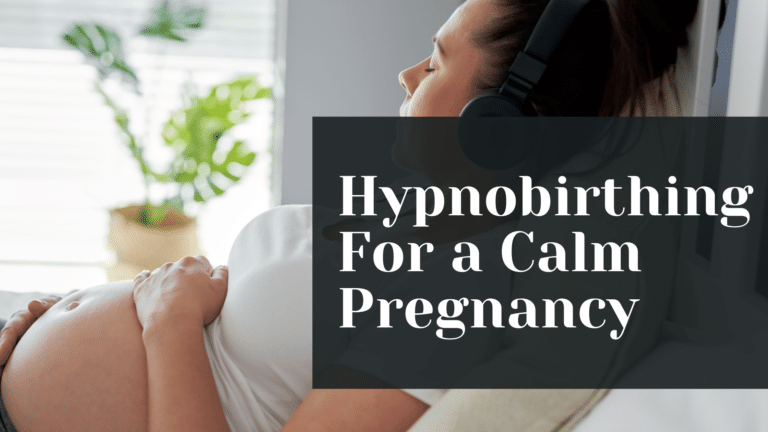Meditation; the not-so-secret key to success
Published on February 27, 2020 – Last Updated on May 11, 2022

Check out the benefits of the meditation infographic.
So what’s meditation all about?
Meditation has sometimes received some bad press, often assumed that you have to do it cross-legged on the floor in a loose white cotton shirt, spending hours’ omm’ingg your way to inner peace. Now, for some people, that’s how they meditate, and most importantly, it brings them happiness. More recently, people are cottoning on to the fact that meditation doesn’t need much practice. As a result, a new wave of guided meditation has started to flood our headphones, packaged as the latest way to well-being. Meditation has centuries of history being prominent in Hinduism and ancient Chinese teachings as a way of connecting with yourself and the world around you.
It’s not about how you sit—It’s about what happens in your brain when you do it.
We strengthen the prefrontal cortex and create new cortical tissue for daily living and self-awareness when we practice meditation. The prefrontal cortex is the area of our brain that controls attention span, impulse control, decision-making skills, and cognitive flexibility , among other things—more than a dozen studies on how this increased thickness is observable using MRI images.
If meditation can make such profound changes to our brains on a structural level, if just 10 minutes a day for eight weeks can increase gray matter in critical areas, then imagine what that period could do for someone with insomnia, depression, or anxiety!
Check out our morning meditation post, where you can find the best tools to start your day refreshed.
The Complete Meditation Pack

Benefits of meditation
Achieving a level of happiness and success that you are content with does not come easy; there is a constant stream of scrutiny and criticism available, comparisons to the lives showcased on social media, unrealistic demands placed by work, and expectations put on how and what we should class as a success. So what do you do when your true aspirations or how you want to live your life doesn’t align with others’ expectations? What effect does this have on your health, wellbeing, and motivation? Although health, happiness, and success can be seen as the pillars of optimal living, all these will be different for every individual depending on their hopes, dreams, and drives. Although unique to the person, the core elements to achieve each are the same. These are; anxiety management, stress reduction, sleep quality, and personal development. All of these core elements can be influenced and enhanced by meditation.
Related reading: meditation timer.
Anxiety management and meditation
Generalized Anxiety Disorder (GAD) and social anxiety are two of the most common forms of stress experienced worldwide; around 1 in 11 people suffer from anxiety (headspace, 2020). Many people may not seek professional help but might be aware that certain situations evoke panicky sensations such as sweaty palms, butterflies in the stomach, nausea, or an underlying feeling you don’t want to do it. Most people experience this on occasions, such as giving a presentation or a job interview. Most people can rationalize this feeling and know the moment will pass. However, this feeling continues to grow and causes negative issues in their lives. As a result, some people will avoid any environment or situation that might risk triggering those feelings of anxiety.
Meditationwon’tt cures anxiety, but it can help manage those negative thoughts and emotions that can trigger anxiety. Studies have shown that regular meditation can help relax neural pathways in the brain that control emotional regulation, including stress (headspace, 2020). So even if you don’t experience mild to moderate anxiety, managing negative emotions and anxious thoughts can help improve your overall mood and ability to explore your thoughts and feelings.
Stress reduction and meditation

Learn how to manage stress with meditation
Stress and anxiety are closely linked. Acute stress or prolonged high-pressure levels can trigger anxiety or anxious feelings around the issues that cause stress. We have experienced stress since the dawn of time; it’s a biological reaction that automatically started to help keep us safe. When danger is recognized, the heart pumps quicker, adrenaline is released to keep us vigilant, and our bodies divert blood away from vital areas like the gut to our muscles to ready us for flight or fight.
This reaction happens in everyone; it is beneficial for troglodytes who have to run or fight dangerous animals; fast forward to today, and the danger is you have a deadline approaching with no time to complete it because of a hectic work schedule, and you have that family meal you can’t get out of tonight. Our brains can not distinguish between an animal about to eat us and an impending deadline. It recognizes the danger and alerts the body. The problem with modern-day stress triggers is constantly around us from work to home, trying to maintain a social life while still exercising. These stressors can build up and harm your mood, happiness, and health. Those who experience high levels of stress for a prolonged time can be at a higher risk of developing high blood pressure, cardiovascular diseases, diabetes, and obesity.
A further view of meditation benefits
Back in the late 1970s at The University of Massachusetts, a professor called Jon Kabat-Zinn looked into the benefits of meditation in reducing stress for people with chronic illnesses. He realized that meditation could be of use to reduce stress for anyone. He is often referred to as the founder of mindfulness as he developed the first guided meditation course called Mindfulness-Based Stress Reduction.
The foundations of this course have gone on to influence all of the mindfulness courses, meditation apps, and resources available today. Kabat-Zinn’s original Mindfulness-Based Stress Reduction is a course that is still widely recommended and used by people worldwide. Guided meditation can help people understand the mechanisms that influence how to be present and tune in with yourself. Concerning stress management, meditation allows you to tap into sources that are causing stress; it might not alleviate the strain entirely. Still, by being aware of it, you can reduce its impact.
Meditation and quality sleep

Sleep is the foundation of overall health, yet getting enough sleep isn’t a priority. During this state of rest, the brain and body complete some essential things that can only happen if given the right amount of time. While asleep, memory and learning are consolidated, the brain flushes out protein and toxins that have built up during the day and muscles and tissue around the body repair. Once all sleep cycles have finished, you’re left feeling alert, refreshed, and motivated.
It is recommended to get between 7-8 hours of sleep per night; some people might need up to 9 hours. The UK averages 6 hours 30mins sleep per night (chemist4u.com, 2018), and the USA average at 6.8hours of sleep (News, 2013); both populations are under the minimum recommended time to gain quality sleep. It might not sound too bad, but consistently getting under 7 hours of sleep per night can impact mental health and motivation levels the next day with increased chances of irritability and low mood. In addition, getting under 5 hours of sleep instantly reduces the body’s control of blood sugar levels for the next day, leading to poor appetite control and increasing cravings for high fat and sugar foods. Consistently reducing the body’s ability to control blood sugars over time can cause significant health problems in the long term.
How to achieve better sleep quality with meditation?
People can find it challenging, especially if they’re feeling anxious or under stress, because their brain doesn’t want to switch off when going to bed. Instead, it decides to pull out and dissect all the things you’re worried about. Partly, this is the effect of anxiety and stress trying to be acknowledged and the repercussions of modern-day life; our brains don’t have the natural signals to start slowing down and getting ready for rest because it’s under constant stimulation from screens and distractions. Through guided meditation, our brains can connect with our natural rhythms to relax and get prepared to rest. Meditation has been shown to improve sleep quality by helping relax the mind and body, promoting the most favorable conditions to fall and stay asleep (headspace, 2020).
Personal development and meditation
Aiming for the complete pack; happiness, health, and success are the basics of personal development. More often than not, you can’t have one without the other, especially not sustained over a long time. Personal development is different for everyone. It might be starting your own business, reaching a promotion, getting fitter, or just being able to manage your days without anxiety or stress. Whatever your goal is, taking the core elements discussed in this article seriously will help set you up with the best possible mindset to keep going forward.
Using guided meditation enables us to be present and mindful of our inner thoughts, feelings, and conflict, providing a platform for self-reflection and motivation. In addition, mindful practices promote a cause, manage anxiety, and reduce stress, all of which are needed to keep pushing towards your goals. On the flip side, mediation also allows us to process and accept any barriers or situations where things don’t go to plan, increasing resilience and acceptance.
The take-a-ways
Practicing meditation isn’t just a trendy gimmick. Using the tools and techniques taught through guided mindfulness can allow you to not only tap into your inner thoughts and feelings, giving you more control over anxiety management and stress reduction, but it can promote quality sleep that boosts mood motivations and improve physical health.
Using these tools allows for personal growth and a better quality of life. The results are limitless with no catches; it takes some commitment and time.



